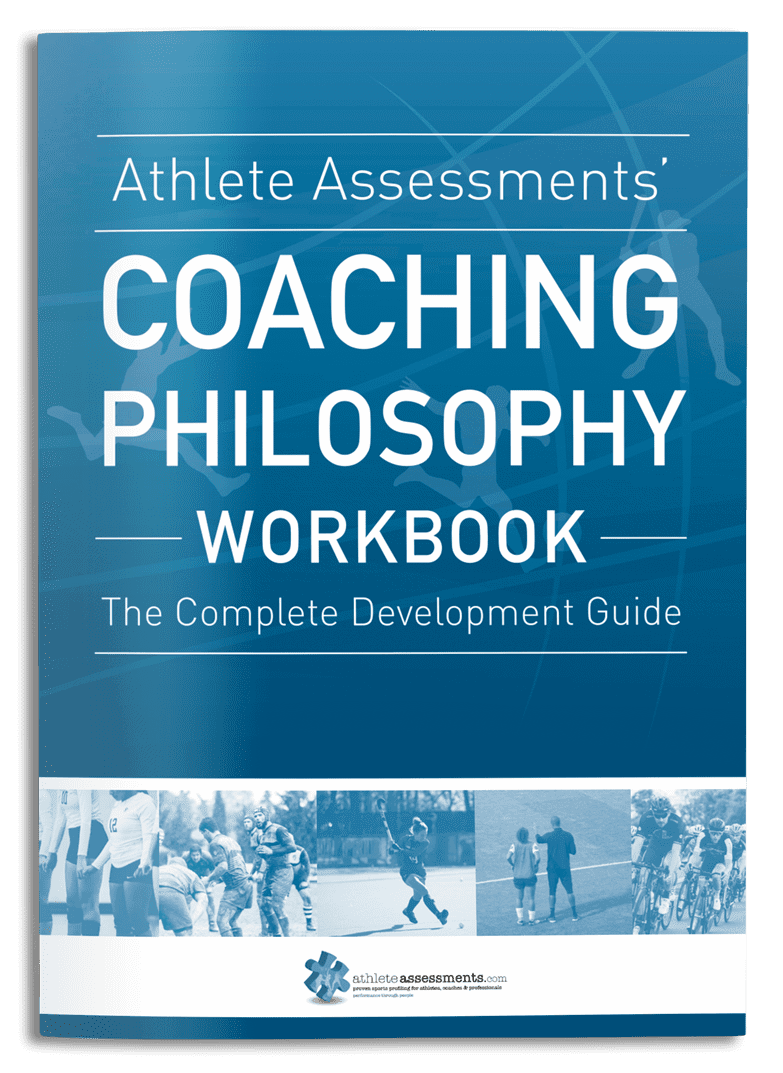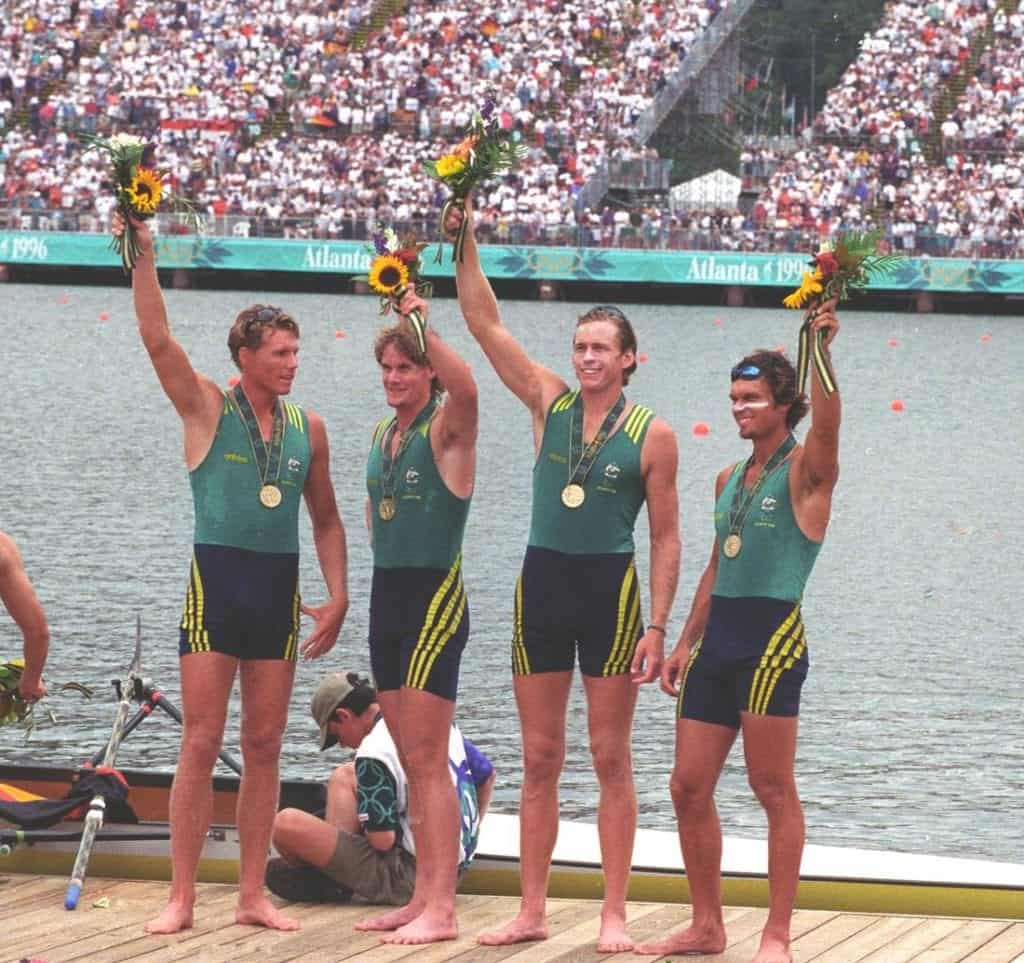Defining a Sport Coaching Philosophy is as critical for sports coaches as it is for business and industry leaders to define their leadership philosophy. It is key for successful coaching. But understanding and developing your Coaching Philosophy is an often overlooked exercise. In this article we discuss what a Sport Coaching Philosophy is, who should develop one, and why you should develop your Sport Coaching Philosophy. We have created the Coaching Philosophy Workbook for coaches to use to discover their own Sport Coaching Philosophy.
What is a Sport Coaching Philosophy?
Our definition of a Sport Coaching Philosophy is a set of values, governing principles and beliefs which determine why you do what you do and how you behave in the context of your coaching role. The fundamentals of a meaningful Sport Coaching Philosophy should contain the ideal of “Why do I coach?” Essentially all coaches utilize a Coaching Philosophy. However its form may vary from a subconscious instinctual understanding, to a refined and recorded document.
Why You Need a Clear Coaching Philosophy
Essentially, having a Sport Coaching Philosophy is vital to any coach as it directly impacts upon their coaching practice. Having a set of guiding values, principles and beliefs ensures consistency in your approach to sport enabling you to prioritize those areas that create your desired results. A defined Sport Coaching Philosophy enables you to make well-judged decisions and actions. It is your consistency in behavior that creates respect and trust in your athletes, leading to a quality relationship. (For more information on the importance of consistent behavior to build trust and create better performance see our articles on Behavioral Predictability for Building Trust, Why People Follow Leaders, and Athlete Centered Coaching)
Who Should Develop a Sport Coaching Philosophy?
The development of a Sport Coaching Philosophy is often neglected by coaches early in their career.
Research suggests that a coach’s perception of Coaching Philosophy is influenced by their experience level as a coach. Typically, less experienced coaches have difficulty understanding the concept behind a Coaching Philosophy and are more focused on making sessions “safe or fun”.
Less experienced coaches can initially create a philosophy which is not completely settled. However their philosophy will evolve with time as they settle on the values and behaviors they are most content and confident with in their sporting role.

COACHING PHILOSOPHY
Workbook - The Complete Development Guide
Coaches are constantly told that having a well-defined Coaching Philosophy is a critical component of a successful career. BUT, it can be a challenge to develop on your own and it takes time to evolve.
We’ve taken years of experience, interviews with leading coaches, research, and testing formulate this workbook for your benefit. Be guided step-by-step through this important process.
5 Steps to Develop Your Sport Coaching Philosophy
We’ve taken years of experience, interviews with leading coaches, research and testing to formulate these five steps to develop your Sport Coaching Philosophy. The five steps are:
Step 1: Identify what is most important to you
To develop your Sport Coaching Philosophy it is important to first have an understanding of the non-negotiable values within your coaching role. Every coach has certain things they never compromise on. If a coach values quality, they will never let their athletes sacrifice technique. By making a distinction between which values you want to have but could perform your coaching role without, and those which you must have, you are able to evaluate how your coaching behavior is impacted by these values. The list of what different coaches’ value is as diverse as there are different types of coaches. So it is important once you have established your values to identify which are your most critical values.
There are many different ways to determine your critical values. In our Sport Coaching Philosophy Workbook we use a Values Assessment. However some people can easily identify their core values by thinking about what they value most in their coaching and then brainstorming and ordering the list.
Step 2: Learn from your own experiences
Being a coach is largely about being yourself and this means being authentic. You are to bring the best of yourself to your role. Having said this, it is certainly true that most coaches learn from the coaches they had in sport. This aspect of learning from your own experiences is something you can bring to your current coaching role.
Without exception, most athletes have been coached at some point in their sporting life by someone who they admired and with whom they developed a quality relationship, built on trust and respect. The opposite is also true. Many athletes can talk about a coach who they did not feel modeled appropriate behavior nor treated their athletes well and as such, you may use these coaches as the antithesis of what type of coach you want to become. You should identify the behaviors, values, and the lessons you learnt from different coaches over your career.
Step 3: What is your Sport Coaching Style?
Every coach has a coaching style which is largely defined by their Behavioral Style. This coaching style will have strengths and weaknesses. Essentially understanding your coaching style will help you to comprehend your motivations, the environment you perform best in, and how you communicate best.
By understanding your coaching style, you are better positioned to be able to adapt to different situations (assuming this is part of your Sport Coaching Philosophy).
Some coaches are highly adaptable and coach their athletes in the way they most require. Other coaches use a one-size-fits-all approach which our research suggests is ineffective.
Ultimately, we are encouraging coaches to become Athlete-Centered in their coaching approach. This means putting the needs and development of your athletes at the center of your focus.
“Athletes don’t care how much you know, until they know how much you care.”
– Inspired by the words of Jim Tunney
Always, this coaching approach relies on knowing how to adapt to the different coaching styles of the DISC Model. These styles and your preferences can be discovered by undertaking a CoachDISC Profile which aides in your own self-discovery.
When we talk about coaching styles, the ideal approach is to learn how to perform each of the four coaching styles effectively.
Step 4: Discover your Sport Coaching Philosophy
Think about the behavior you wish to exhibit consistently, how you wish to conduct yourself, how this behavior will impact on your athletes, and the results of this impact. Now you can begin to create a framework to govern your conduct in your coaching role. This is a large part of your Sport Coaching Philosophy and should link to where you discovered your core values in relation to being a coach.
Another aspect to the coaching role and philosophy is how you define success. Although this should also be linked to your values, sport is a domain where in every way, people keep score. Defining what truly is success is often not a simple matter of determining who has more points at the end of a game. Winning, therefore is only part of the measure of success (of course this is dependent on your Sport Coaching Philosophy, right?)
You should define your unique Sport Coaching Philosophy in a succinct statement. Some coaches find it useful to use a spare piece of paper to write a few different versions until they are able to refine the statement to a point they are fully satisfied with.
Step 5: Keep it visible and alive
Having now compiled your values, behaviors, and definitions of success, the final step is to keep this consolidated work in a place where you can review it regularly and see it every day. Your Sport Coaching Philosophy is something unique to you about who you are and want to be. It is important to constantly remind yourself of what your philosophy is. Some Coaches post this in laminated form on their desk; others keep it in their coaching diary
You can measure yourself against your philosophy’s behaviors and judge for yourself whether you are living out your philosophy. It is useful to review whether your philosophy is giving you the outcomes you value most and you can continue to develop and evolve it over time as needed.
Summary
Understanding and developing your Sport Coaching Philosophy is critical. If you haven’t already, take the time today to focus on this important exercise and see how your athletes benefit. Our Sport Coaching Philosophy Workbook is a ‘How To’ guide especially designed to assist coaches in developing their own personalized Sport Coaching Philosophy.

COACHING PHILOSOPHY
Workbook - The Complete Development Guide
Coaches are constantly told that having a well-defined Coaching Philosophy is a critical component of a successful career. BUT, it can be a challenge to develop on your own and it takes time to evolve.
We’ve taken years of experience, interviews with leading coaches, research, and testing formulate this workbook for your benefit. Be guided step-by-step through this important process.
You may also be interested in seeing Example Sport Coaching Philosophies sent in by other Coaches.
What Others Have to Say on Developing Sport Coaching Philosophies
Our earlier version of this article included reference to the British Cycling methodology and for those readers who would like this information we have included it here. According to an article published by British Cycling, creating a personal coaching philosophy is…“A much underutilized concept, coaches rarely take the time to stop and fully consider what their own guiding principles to coaching are and how these will provide the underpinning foundations for their coaching practices.”
In the article the following were suggested as factors which influence the way you coach.
Your Coaching Motives – The reasons why you take up coaching will undoubtedly affect how you coach. For example, if you wish to see young people develop socially and learn new skills, you will adopt a supportive, educational approach to coaching and place an emphasis on personal development rather than competitive success.
The Athletes – If you adopt an athlete-centered approach, as is recommended, you should adapt your coaching style to meet the specific needs of your athletes.
The Situation – There are some situations in which a particular style of coaching is more appropriate than another. In certain contexts for example, where safety is an important issue, it might be more appropriate to adopt a directive approach to coaching, in order to maintain control and ensure that accidents do not happen and athletes behave in an appropriate manner.
Your Personality – Coaches are human beings and therefore have individual personalities. Some Coaches may be extroverted, outgoing and lively in their approach to coaching while others may be more introverted and go about their coaching in a quiet, calm manner. In truth, personality does not matter, provided that appropriate actions and behaviors are maintained which relate to the situation.
Your Knowledge – The more knowledgeable you are as a Coach the more options you will have available to you to plan and deliver effective sessions. Knowledge will also help you to feel confident and create a positive environment for your athletes. A Coach lacking in knowledge may come across as low in confidence and may be perceived as lacking skills or the ability of knowing how to deal with certain situations.
If you would like a copy of the original British Cycling study, please contact us with this request.
Want more information?
As mentioned above, a key to developing your ability to use all four coaching styles is to first understand what your natural preferences are and what your strengths and weaknesses are.
Athlete Assessments’ CoachDISC behavioral profile supports this important step. The CoachDISC profile uses proven profiling techniques and is based on decades of behavioral research and many years of top level sporting experience.

COACHING PHILOSOPHY
Workbook - The Complete Development Guide
Coaches are constantly told that having a well-defined Coaching Philosophy is a critical component of a successful career. BUT, it can be a challenge to develop on your own and it takes time to evolve.
We’ve taken years of experience, interviews with leading coaches, research, and testing formulate this workbook for your benefit. Be guided step-by-step through this important process.
Where to from here?
After completing your questionnaire, which takes just 10-12-minutes, you receive an in depth 40-page personalized report. Your report analyzes your personal style, strengths, and limitations and gives you tools and strategies you can start using straight away. The CoachDISC profile is suitable for coaches of ALL levels. The profile is easy and convenient to use and all done online. It only costs about as much as a pair of sports shoes, and carries a money-back guarantee.
At Athlete Assessments, we’re here to provide you with excellence in service and to help you be your best. If there is anything we can assist you with, please contact us.
Recommended Articles
When we look at leaders in any endeavor, we often see their success critically defined by their leadership philosophy, and when it comes to sport coaches it is exactly the same. Having a defined coaching philosophy is key to effective coaching (and leadership), but the process of developing and understanding your own philosophy is often sidelined. When your team relies on your performance as a coach as much as they do on technical execution for achieving a winning outcome, this process is a priority.
In any industry, recruiting the right person to join your team is a challenging task, but when done right can be extremely rewarding. We spoke to a panel of head coaches who are experts in recruiting assistant coaches for their own programs. Think of this as the how-to for recruiting the right assistant coach, the effects it has on team culture, and why it’s part of a head coach’s role to get it right.
Ever spent time wondering how expert coaches operate? In this article we take a quick look at what the 'experts' do that makes them experts. This research was derived from how experts conduct themselves across a wide domain of industries and areas of endeavor. Expertise is universal and we apply this to coaching sport.
At Athlete Assessments, we have found that our readers have a great interest in the coaching philosophies of other Coaches. And why wouldn’t they? Now you can benefit from the philosophies other Coaches have shared with us. You might find these useful in developing or further defining what your own coaching philosophy is. Or you might simply be interested in reading examples of coaching philosophies from other sports Coaches. Please contribute your coaching philosophy too! There is a form at the bottom of the page where you can contribute!








